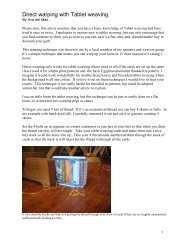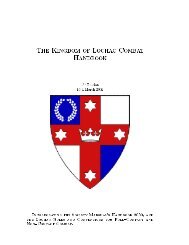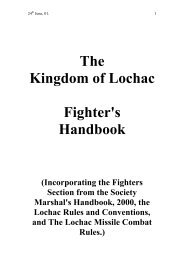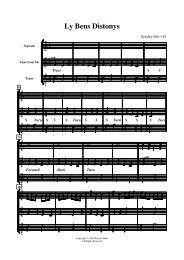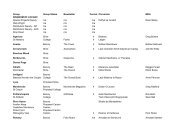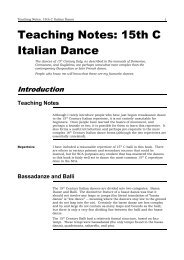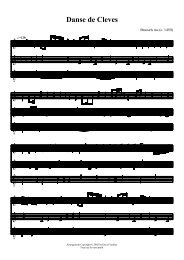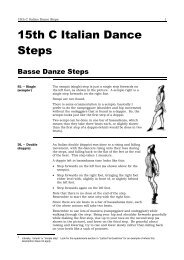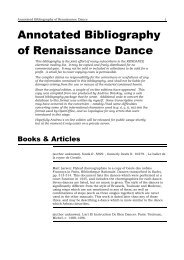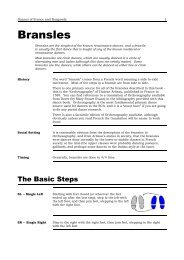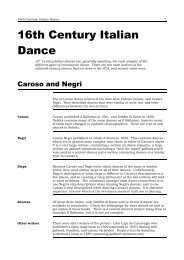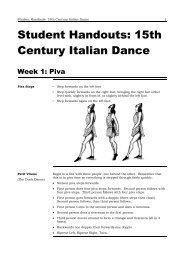Kingdom of Lochac Combat Handbook - SCA Ltd (Australia)
Kingdom of Lochac Combat Handbook - SCA Ltd (Australia)
Kingdom of Lochac Combat Handbook - SCA Ltd (Australia)
Create successful ePaper yourself
Turn your PDF publications into a flip-book with our unique Google optimized e-Paper software.
18 CHAPTER 4. CONVENTIONS OF COMBAT9. If fighting occurs within 2 metres <strong>of</strong> an engine that is cocked or loaded, a hold shall be called and the engineshall be declared destroyed, made safe and removed from the combat area.10. Once the crew <strong>of</strong> a siege engine is killed, the engine is considered destroyed for the remainder <strong>of</strong> the battleand must be made safe and removed from the combat area.11. A misfire from a cannon will render all <strong>of</strong> the crew dead.4.4.5 Killing from behind1. Heavy combatants will kill other heavy combatants from behind by placing a weapon across the faceplateor on the shoulder <strong>of</strong> the opponent and loudly calling “You are slain from behind” or an equivalent phrase.This technique will also be used for other heavy combatants with which they are not engaged. This actionmust be repeated for every opponent to be killed in this manner and may not be done while running past theopponent.2. As with killing from the front, it is up to the defendant as to whether a kill from behind was good or not,but the overriding rule for killing from behind, killing helpless opponents and killing plumed opponents isthat if the defender believes the attacker could have struck them but instead declared them dead, they shouldaccept the kill.4.4.6 Helpless Opponents1. It is forbidden to strike a helpless opponent, such as a combatant who has fallen down or a heavy combatantwho is unable to defend themself, but it is not required to allow the opponent to regain their footing orweapon.2. Helpless opponents shall be killed by placing your weapon on the opponent and saying in a loud voice “Youare dead, my lord” or an equivalent phrase.3. A combatant is considered to have fallen down if any part <strong>of</strong> their torso is in contact with the ground or theyneed to use an arm or hand in contact with the ground to hold themselves up. In a war situation a fallencombatant may only try to escape, and may not fight from the ground. In a tournament bout a hold shall becalled for a fallen combatant.4. It is acceptable for an opponent to try to escape from a helpless situation only in war situations. They willbe considered dead if, at any time during their attempt to regain their footing or their melee weapon, theyare killed in the above manner.5. Unarmed fighters in war scenarios may not necessarily be helpless, for example gauntleted spear grabbers,though if in doubt they should be treated as helpless.4.5 Holds1. A call <strong>of</strong> “hold!” is a call for an immediate cessation <strong>of</strong> all activity on the field.2. Holds may be called by anyone, including spectators, for any <strong>of</strong> the following reasons:(a) Broken weapons 3(b) Broken armour 4(c) Broken people (i.e., injuries)(d) Broken tempers(e) Broken ground (i.e., hazardous terrain)(f) Broken boundaries (i.e., someone/thing coming onto the field that should not be there or combatantsleaving the bounds <strong>of</strong> combat)3 It may not be necessary to call a hold if this can be dealt with safely without a hold.4 As for footnote 3Date : 2007/06/2109 : 43 : 49RCS f ile : f ighters − handbook − 2.lyx,v Revision : 1.4The <strong>of</strong>ficial version <strong>of</strong> this document is available at http://www.sca.org.au/marshal/ Photocopied or printed editions <strong>of</strong> this document are notcontrolled.



